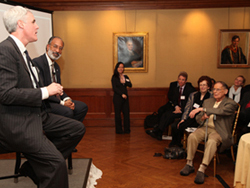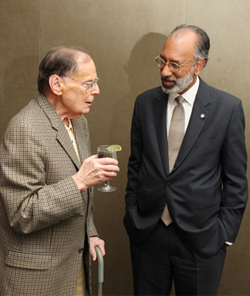A Peacemakers' Reunion
UN Ombudsman Johnston Barkat headlined an event for alumni of TC's International Center for Cooperation and Conflict Resolution
By Suzanne Guillette
As United Nations Ombudsman, charged with mediating conflicts involving UN staff worldwide, Johnston Barkat has seen some impressive examples of people working out thorny situations. Yet the one he chose to talk about at a recent alumni gathering for TC’s International Center for Cooperation and Conflict Resolution (ICCCR )involved his two young daughters and occurred almost literally in his own backyard.
Barkat (the first student ever to receive a certificate from ICCCR) and his two girls, ages nine and 11, had come upon a group children arguing over rights to a fort in a Westchester County woodland. Barkat’s daughters designated a special “meeting rock” where the kids could congregate to resolve their differences. According to the rules that one of the girls set forth, everyone had to agree to mediation. Without it, she said, “One war will lead to other wars and this will never end.”
Clearly, Dad gets listened to in the Barkat home. And just as clearly, the ideas imparted by ICCCR exert a compelling effect – not only at the negotiating table, but on alumni, more than 100 of whom turned out on a rainy evening in March to hear talks by Barkat and ICCCR Director Peter Coleman, Associate Professor of Psychology and Education.
“This was a great event for us,” said Coleman, who presented findings from his new book, The Five Percent: Finding Solutions to Seemingly Impossible Conflicts. “It really demonstrated the impact the program has had. The turnout was gratifying and showed that our alumni are working in a range of important roles and settings.”
ICCCR, founded by TC Professor Emeritus Morton Deutsch, is based in the Department of Organization and Leadership. The Center develops knowledge, practices and tools to promote constructive conflict resolution, effective cooperation and social justice. Since 1995 it has offered a 16-credit series of courses leading to a New York State Certificate.
Coleman -- himself a TC alumnus -- opened his talk by asking the audience to participate in an exercise. “Let’s start with something small, like the Israeli-Palestinian conflict,” he deadpanned. “Take one minute to explain to your neighbor why it’s been so hard to solve.”
The point, of course, was to illustrate the problems inherent in reductive explanations. Or as one participant in a 2002 study on conflict resolution cited by Coleman put it, “people don’t realize how many stakeholders there are” in most situations.
“We live in a time of increasing complexity and interdependence of elements,” Coleman said. When coupled with “an underlying proclivity for change, development and evolution” within people and systems, this complexity can lead to a sense of being overwhelmed. People often respond by over-simplifying in their analysis of what’s going on – and that can make things worse.
Coleman observed that social science research, which tends to rely on theory, methodology and models, may sometimes miss key situational details. “Rarely do we look at the unique aspects of a conflict,” he said. “Perhaps it would be more useful for us to ask, ‘What did we learn? What were the unintended consequences of our approach to resolving the conflict’?’”
Using his daughters’ approach as a starting point, Barkat took the audience through a case study he called, "The Darfur Diary: A Simple Story of Complexity and Conflict."
Roughly the size of France, Darfur is home to 40 million people, 600 tribes and some 400 languages and dialects. Resources are scarce, with half the country lacking access to potable water and 40 percent of the population living in homes without indoor plumbing. With such basic needs unmet, one might expect conflicts to escalate dramatically.
And yet, Barkat said, people – at least at the individual level – are concerned with finding fair solutions to their problems. “It’s the way that people are treated in the process of resolution that matters,” he said.
Barkat offered a de facto checklist for resolving conflict that included making mediation proceedings participatory; assigning neutral parties to mediate the resolution; encouraging trust in responsible authority figures; and treating all parties with dignity and respect.
Reflecting on the way his daughters and their young friends came to an amicable agreement about the fort in the woods, Barkat said, “I’m proud of children who can mediate these kinds of negotiations. That’s something that adults seem to take years to figure out.”
Published Thursday, May. 12, 2011

